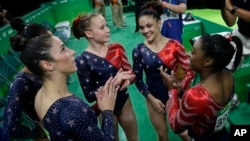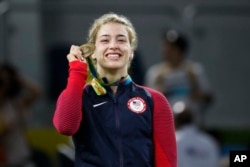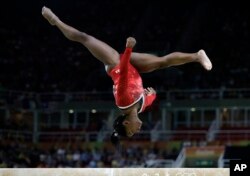When the U.S. women's gymnastics team was photographed laughing and talking after they blew away the competition in a qualifying round at the 2016 Olympics in Rio de Janeiro, an NBC announcer said, "They might as well be standing in the middle of a mall.”
Commentator Al Trautwig said 24-year-old Dutch gymnast Sanne Wevers, who was writing down her score after an event, looked like she was scribbling an entry in her diary.
Announcer Dan Hicks gave the credit for Hungarian swimmer Katinka Hosszu's gold medal to her husband and coach, calling him "the guy responsible."
The Chicago Tribune identified bronze medal winner Corey Cogdell-Unrein in a headline as "wife of a Bears lineman," without mentioning her name or her event, trap-shooting.
A BBC announcer, John Inverness, called a women's judo match a "catfight" and the next day, interviewing British tennis player Andy Murray about his win, had to be reminded about the achievements of U.S. tennis players Venus and Serena Williams, each of whom have won four Olympic gold medals.
During gymnastics coverage, two male Fox News announcers devoted several minutes of conversation to the female athletes' makeup choices. Commentator Bo Dietl said: "When you see an athlete, why should I have to look at some chick's zits or some guy's zits on his face? Why not a little blush on her lips, and cover those zits? I like to see a person who wins that gold medal go up there and look beautiful."
These and many other awkward comments by Olympics announcers — defining female athletes by their relationships to men, commenting on their appearances or stereotyping their behavior — have made the 2016 Summer Games in Rio the center of a heated conversation about how female athletes are treated by the media.
Equal time, unequal treatment
The Olympic Games are one of the few times women's athletics get equal coverage with men's on television. In 2012, the Games in London were the first to feature women competing in every sport, including boxing.
A 2015 study from the University of Southern California found that Los Angeles broadcast affiliates spent only 3.2 percent of their airtime on women's sports, a number that actually declined from 5 percent in 1989.
The study found that the sports network ESPN has spent only 2 percent of its time on women sports, a rate that has not changed in 26 years.
But the Olympics are far more balanced: a team of researchers found that 58 percent of the first half of the Olympics telecast from Rio featured female athletes. Yet among journalists covering the Games, only 21 percent are female.
So perhaps it's understandable that sportscasters and reporters are being criticized for how they talk about women — they have had very little practice, and these Games seem to be the first in which gender equality in sports coverage has become a major topic.
A study from Cambridge University, released just prior to the beginning of the Rio Olympics, looked at more than 160 million words from news articles, social media, internet forums and elsewhere, analyzing the words used to describe men and women in association with Olympic sports.
Men were found to be more often described as "great," "strong" and "fastest." Women, however, were most often described in terms that had nothing to do with their athletic ability: "aged," "older," "pregnant," "married."
Los Angeles-based market researcher Rebecca Brooks says such differentiations have existed for decades.
"I would argue that sexism in Olympics coverage is nothing new," Brooks says. "Many of the broadcasters covering the Rio Olympics are the same reporters who have covered the events in past decades."
Why, then, has sexist language in Olympic coverage become an issue this year?
Social media may be the answer, according to experts.
Social media feedback
"Today, the feedback loop for any on-camera performer is instantaneous via Twitter and Facebook and Snapshot," says James Furrier, a journalist who teaches at Metropolitan State University in Denver, Colorado.
"Now we have MP3 files and YouTube and social media, weapons brandished by a ready-and-willing vast population of analysts, critics, pundits and trolls, all taking their chops whenever a broadcaster fluffs (makes an error)," Furrier says.
Not only is the audience able to respond quickly on social media, says A.J. Marsden, assistant professor of psychology at Beacon College in Leesburg, Florida, "millennials are a little more keen to pick up on these things."
"A number of people who have been accused of sexist statements are a little bit older; they're not used to being called out on this stuff. I don't think they're being intentionally sexist," Marsden says.
She also notes that sexism in Olympics coverage goes both ways.
NBC morning host Hoda Kotb and correspondent Jenna Bush Hager smoothed coconut oil across the torso of Tongolese athlete Pita Taufatofua on live television the day after the Olympics' opening ceremony.
And Cosmopolitan magazine recently ran an article called "36 Summer Olympic Bulges That Deserve Gold," featuring photos of male Olympic athletes wearing tight briefs. Sharp-eyed readers pointed out on social media that just two years earlier, Cosmopolitan had published an article titled "Men Who Objectify Women Are Effing Horrible."
Journalist Lindy West, who writes about gender equality and body image, wrote a column for Britain's The Guardian newspaper in which she offered some tips to journalists writing about female athletes.
"Don't spend more time discussing female athletes' makeup, hairdos, very small shorts, hijabs, bitchy resting faces, voice pitch, thigh circumference, marital status and age than you spend analyzing the incredible feats of strength and skill they have honed over a lifetime of superhuman discipline and restraint."
Instead, she said, journalists should write about female athletes "the way you write about male athletes -- i.e., without mentioning their gender except maybe in the name of the sport."
Kris Macomber, sociology professor at Meredith College in Raleigh, North Carolina, thinks the increased discussion about the way we describe athletes during competition will improve accountability over time.
Progress
"Social media gives a voice to many who would otherwise be kept out of the conversation. Historically, voices of dissent and critique were marginalized and silenced," Macomber says. "But today, with the internet and Twitter and the like, you can no longer silence people.
"When we see unfairness, we want to voice our dissent and now we have the means and platform to do so," she adds.
Meanwhile, not all the news about Olympics coverage is bad. Female athletes are speaking up for themselves.
Nineteen-year-old U.S. gymnast Simone Biles told Sporting News that her considerable accomplishments — four gold medals and a bronze — should not be measured in relation to the accomplishments of male athletes.
"I'm not the next Usain Bolt or Michael Phelps," she said. "I'm the first Simone Biles."
As for how this year's Rio Games will be remembered, the Cambridge experts who studied words associated with male and female Olympians will have some input. They plan to release an analysis of this year's Olympics coverage in the next few weeks.






